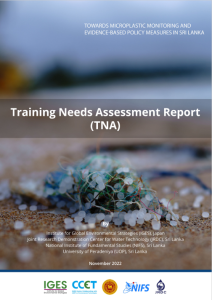The report assesses the level of public awareness of microplastic pollution and related hazards as well as the current status of microplastic monitoring facilities available in Sri Lanka’s state and private sector institutes, with an emphasis on the public water supply chain and identifying microplastic point sources upstream to ensure safe drinking water. The survey results of this work provide the essential first step in formulating mitigation programs to prevent aquatic microplastic pollution and build human capacity in Sri Lanka. The TNA report comprises four broad themes, namely, (1) the Status of public awareness of microplastics, (2) Engagement level assessment on sampling, analysis, and research publications related to microplastics, (3) Capacity and gap assessment for determining the degree of microplastic pollution, and (4) Recommendations for achieving the required monitoring activities of microplastics. The survey results of the TNA include a nationwide data assessment. This TNA project was governed by the principles of participatory qualitative assessments and followed the established steps, involving the identification of problems and assessment of design needs, collection and analysis of information, compilation of a preliminary report reviewed by national, regional, and international peers, and data validation via random stakeholder consultations and expert reviews. Information compilation and analysis followed a five-step process and the existing situation was evaluated against the desired situation. The cumulative training gap identification outcomes were presented at the national workshop for validation and later revised accordingly. These were presented to the thematic experts, from whom the views and recommendations solicited were incorporated into the identified training needs. The key training and facility needs identified through this TNA are, a) Gaps in awareness of microplastic-related pollution and impacts, which may lead to insufficient engagement of the potential stakeholders identified in monitoring and policymaking; b) Addressing such awareness gaps through engaging stakeholders in awareness programs; c) Institutionalization of any program outcomes developed; d) Development of organizational scope-related skills through training programs, and e) Development of facilities and formation of organized intra- and inter-organizational systems to conduct the monitoring programs. As a result of this TNA, the final training needs identified were categorized as knowledge, attitudes, and skills and used as the basis for the module development of each theme. The expressed opinions and information collected during the TNA did not, in their entirety, end up as training needs; instead, some were retained for incorporation into recommendations for the planned future project implementation.
Training Needs Assessment Report (TNA): Towards Microplastic Monitoring and Evidence-Based Policy Measures in Sri Lanka
- Authors
-
Amila ABEYNAYAKA, Premakumara Jagath DICKELLA GAMARALALAGE, Madhubashini MAKEHELWALA, Sujithra Kaushalya WERAGODA, Lakmal JAYARATHNE, Mallika PINNAWALA, Avanthi Deshani IGALAVITHANA, Chamil PERERA
- Copyrights
-
Institute for Global Environmental Strategies
- Publication Date
-

